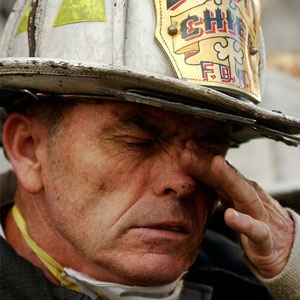
Breathing problems among New York Fire Department employees, caused by dust, smoke and other toxic chemicals, became apparent one year after the twin towers collapsed. Their lung capacity typically diminished as if they had aged 12 years.
Doctors had hoped their lungs would gradually rebound, as they often do from routine smoke exposure.
But over the next six years, their lungs continued to worsen, Dr. David Prezant of the Albert Einstein College of Medicine in New York, who led the study, said in a telephone interview.
Firefighters who had never smoked tobacco lost about 25 milliliters of lung volume annually, as measured by the amount of air they could rapidly blow out in one second.
Emergency medical services personnel lost about 40 milliliters, Prezant and colleagues reported in the New England Journal of Medicine.
That is comparable to the decline seen in nonsmokers when they age, Prezant said. But because rescue workers took such an initial hit on their lung capacity, the continued decline meant many now suffer from breathing problems.
The city has been conducting lung capacity tests on its rescue personnel since 1997.
Read: App that can diagnose your cough
Before Sept. 11, very few firefighters scored below normal for their age on the test. Years later, 13 percent did.Among emergency medical services workers, 11 percent had below-normal results before the collapse of the twin towers; seven years later, 23 percent scored low.
"This was different from a regular fire in that it included not just the combustion byproducts you would see in a normal house fire, but the combustion byproducts of thousands and thousands of gallons of jet fuel from the two planes that collided, and the incredibly dense nature of the exposure to particulate matter that you don't see in a fire," Prezant said.
The study also compared rescue workers who were at the scene initially and those who showed up a day or more later, and found that the early responders suffered the most. In all, the attack in which two hijacked passenger jets were crashed into the buildings killed 2,751 people, including 343 fire department workers.
Read more:
9/11 cancers taking a toll



 Publications
Publications
 Partners
Partners















